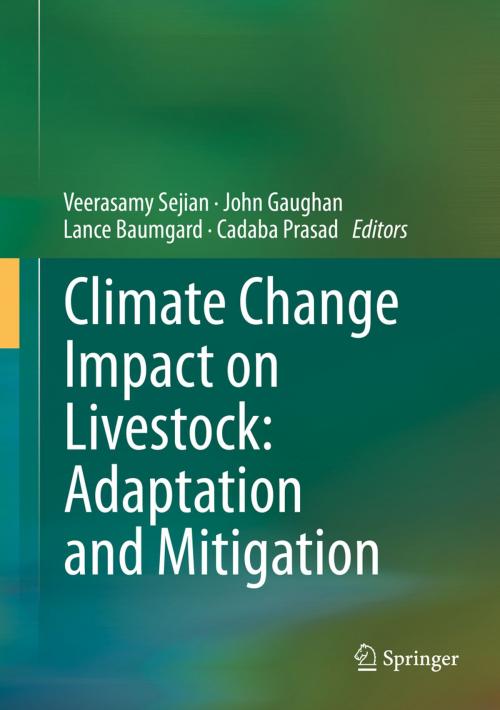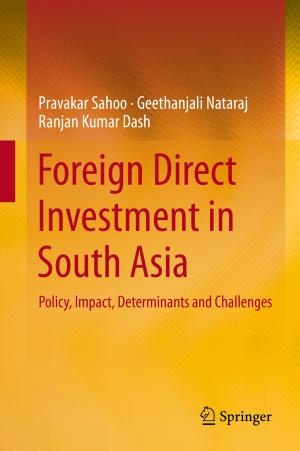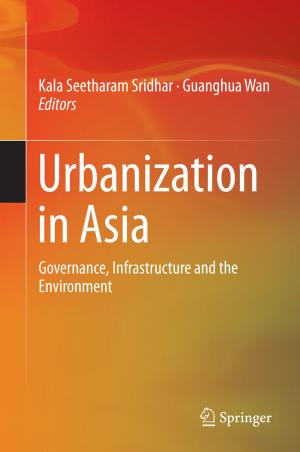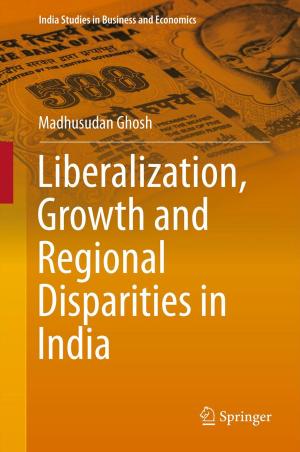Climate Change Impact on Livestock: Adaptation and Mitigation
Nonfiction, Science & Nature, Science, Biological Sciences, Environmental Science, Earth Sciences, Nature| Author: | ISBN: | 9788132222651 | |
| Publisher: | Springer India | Publication: | March 31, 2015 |
| Imprint: | Springer | Language: | English |
| Author: | |
| ISBN: | 9788132222651 |
| Publisher: | Springer India |
| Publication: | March 31, 2015 |
| Imprint: | Springer |
| Language: | English |
This volume addresses in detail both livestock’s role in climate change and the impacts of climate change on livestock production and reproduction. Apart from these cardinal principles of climate change and livestock production, this volume also examines the various strategies used to mitigate livestock-related GHG emissions, and those which can reduce the impacts of climate change on livestock production and reproduction. Presenting information and case studies collected and analyzed by professionals working in diversified ecological zones, the book explores the influence of climate change on livestock production across the globe. The most significant feature of this book is that it addresses in detail the different adaptation strategies and identifies targets for different stakeholders in connection with climate change and livestock production. Further, it puts forward development plans that will allow the livestock industries to cope with current climate changes and strategies that will mitigate the effects by 2025. Lastly, it provides researchers and policymakers several researchable priorities to help develop economically viable solutions for livestock production with less GHG emissions, promoting a cleaner environment in which human beings and livestock can live in harmony without adverse effects on productivity.
Given that livestock production systems are sensitive to climate change and at the same are themselves a contributor to the phenomenon, climate change has the potential to pose an increasingly formidable challenge to the development of the livestock sector. However, there is a dearth of scientific information on adapting livestock production to the changing climate; as such, well-founded reference material on sustaining livestock production systems under the changing climate scenarios in different agro-ecological zones of the world is essential. By methodically and extensively addressing all aspects of climate change and livestock production, this volume offers a valuable tool for understanding the hidden intricacies of climatic stress and its influence on livestock production.
This volume addresses in detail both livestock’s role in climate change and the impacts of climate change on livestock production and reproduction. Apart from these cardinal principles of climate change and livestock production, this volume also examines the various strategies used to mitigate livestock-related GHG emissions, and those which can reduce the impacts of climate change on livestock production and reproduction. Presenting information and case studies collected and analyzed by professionals working in diversified ecological zones, the book explores the influence of climate change on livestock production across the globe. The most significant feature of this book is that it addresses in detail the different adaptation strategies and identifies targets for different stakeholders in connection with climate change and livestock production. Further, it puts forward development plans that will allow the livestock industries to cope with current climate changes and strategies that will mitigate the effects by 2025. Lastly, it provides researchers and policymakers several researchable priorities to help develop economically viable solutions for livestock production with less GHG emissions, promoting a cleaner environment in which human beings and livestock can live in harmony without adverse effects on productivity.
Given that livestock production systems are sensitive to climate change and at the same are themselves a contributor to the phenomenon, climate change has the potential to pose an increasingly formidable challenge to the development of the livestock sector. However, there is a dearth of scientific information on adapting livestock production to the changing climate; as such, well-founded reference material on sustaining livestock production systems under the changing climate scenarios in different agro-ecological zones of the world is essential. By methodically and extensively addressing all aspects of climate change and livestock production, this volume offers a valuable tool for understanding the hidden intricacies of climatic stress and its influence on livestock production.















